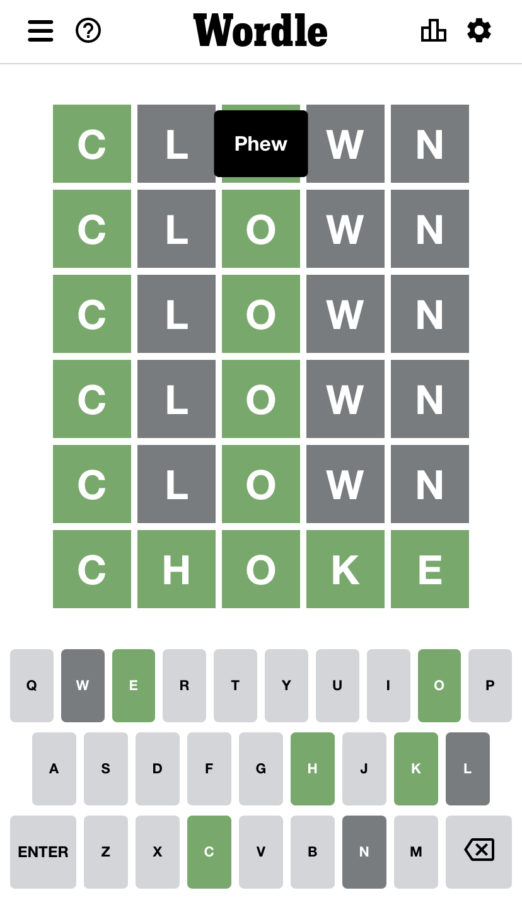The Universal Appeal of Wordle
A screenshot of the Wordle site.
Wordle, the word game that’s taken the internet by storm, has undeniable appeal. If you’ve been anywhere near the internet, you’ve seen those green boxes filling up your feed. Its popularity is simple: the game is relatively easy to play and is unfussy. Created by Josh Wardle, a software engineer, in October 2021, the game now averages 300,000 players a day. Anybody who’s anybody plays it, from celebrities to your grandmother.
Naturally, themed Wordles quickly sprung up. Some feature words centered around certain artists (Taylordle and Phoebordle). Others are for die-hard movie fans (Star Wordle and Lordle of the Rings). In all versions of the game, however specific the themes are, your goal is to guess a five-letter word in six tries or less. Every time you enter a word, there are different responses from the game. A green letter means you’ve chosen the correct letter, and it’s in the right spot, yellow means you have a correct letter, but in the wrong place, and grey or black means that the letter isn’t anywhere in the word.
By the fourth try, things start getting stressful. You guess increasingly random words. Surely, CLOWN will produce something fruitful? The site even gets stressed out for you- if you manage to guess the word on the sixth try, the site shows a “Phew” message. In the horrifying and all too common scenario when you don’t guess the word at all, the site ends up giving you the answer.
The game is based on other word games, including the New York Times’ popular Spelling Bee. Like its predecessor, there’s only one word a day, raising the stakes of an otherwise unassuming game. Wordle, however, gives no hints or clues as to what the word might be. You just have to use your intuition… and maybe some math. One of its sell- ing points (and a crucial part of its shareability) is the coveted starting word. Some keep their word secret; others share with the world. Grant Sanderson, a mathematician and You- Tuber also known as 3Blue1Brown, made a video detailing his Wordle-solving bot. The best information gleaned from the video? The mathematically-proven best starting word is CRANE, though LATER, IRATE, and RAISE also work well. They make sense- the words feature some of the most common letters in the English language and a few vowels.
In late January, Wordle was acquired by the New York Times, a sale speculated to be worth at least $1 million. Not bad for a barebones game that had just 90 players in November 2021.
Many of its players are often baffled by its vaguely British-sounding (or just plain obscure) words, which can be accredited to its Welsh-born creator. Words like BLOKE, TROVE, and CAULK could help some expand their vocabulary. Or you could pick up a book.
Imagine this scenario: Wordle begins to entrap you in its soul-sucking rhythm. You spend agonizing hours contemplating devoting your life to keeping a streak. Forgone vacations are consumed by researching how, really, you can get the word in one try without a lucky guess. Years-long friendships ended over spoilers. Constant thinking about how much happier you would be if there were, say, an unlimited number of Wordles to solve. Well, as it turns out, there is a solution to your very real struggle: Wordle Unlimited, which serves up an infinite number of words. Sure, it destroys the anticipation of the limitation of one word a day, and you might spend hours stuck in the intoxicating rhythm of blindly guessing words. But who cares anymore? In a time of never-ending evil and pandemics and conflict, at least it’s better than doomscrolling. Lesson learned: never use CLOWN as a starting word.



